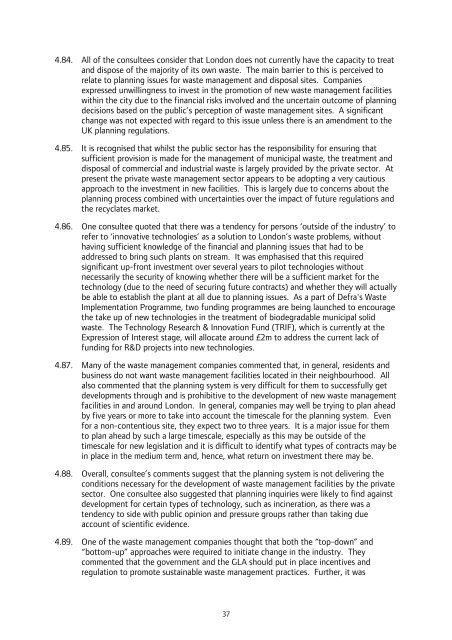London Wider Waste Strategy - London - Greater London Authority
London Wider Waste Strategy - London - Greater London Authority
London Wider Waste Strategy - London - Greater London Authority
You also want an ePaper? Increase the reach of your titles
YUMPU automatically turns print PDFs into web optimized ePapers that Google loves.
4.84. All of the consultees consider that <strong>London</strong> does not currently have the capacity to treat<br />
and dispose of the majority of its own waste. The main barrier to this is perceived to<br />
relate to planning issues for waste management and disposal sites. Companies<br />
expressed unwillingness to invest in the promotion of new waste management facilities<br />
within the city due to the financial risks involved and the uncertain outcome of planning<br />
decisions based on the public’s perception of waste management sites. A significant<br />
change was not expected with regard to this issue unless there is an amendment to the<br />
UK planning regulations.<br />
4.85. It is recognised that whilst the public sector has the responsibility for ensuring that<br />
sufficient provision is made for the management of municipal waste, the treatment and<br />
disposal of commercial and industrial waste is largely provided by the private sector. At<br />
present the private waste management sector appears to be adopting a very cautious<br />
approach to the investment in new facilities. This is largely due to concerns about the<br />
planning process combined with uncertainties over the impact of future regulations and<br />
the recyclates market.<br />
4.86. One consultee quoted that there was a tendency for persons ‘outside of the industry’ to<br />
refer to ‘innovative technologies’ as a solution to <strong>London</strong>’s waste problems, without<br />
having sufficient knowledge of the financial and planning issues that had to be<br />
addressed to bring such plants on stream. It was emphasised that this required<br />
significant up-front investment over several years to pilot technologies without<br />
necessarily the security of knowing whether there will be a sufficient market for the<br />
technology (due to the need of securing future contracts) and whether they will actually<br />
be able to establish the plant at all due to planning issues. As a part of Defra's <strong>Waste</strong><br />
Implementation Programme, two funding programmes are being launched to encourage<br />
the take up of new technologies in the treatment of biodegradable municipal solid<br />
waste. The Technology Research & Innovation Fund (TRIF), which is currently at the<br />
Expression of Interest stage, will allocate around £2m to address the current lack of<br />
funding for R&D projects into new technologies.<br />
4.87. Many of the waste management companies commented that, in general, residents and<br />
business do not want waste management facilities located in their neighbourhood. All<br />
also commented that the planning system is very difficult for them to successfully get<br />
developments through and is prohibitive to the development of new waste management<br />
facilities in and around <strong>London</strong>. In general, companies may well be trying to plan ahead<br />
by five years or more to take into account the timescale for the planning system. Even<br />
for a non-contentious site, they expect two to three years. It is a major issue for them<br />
to plan ahead by such a large timescale, especially as this may be outside of the<br />
timescale for new legislation and it is difficult to identify what types of contracts may be<br />
in place in the medium term and, hence, what return on investment there may be.<br />
4.88. Overall, consultee’s comments suggest that the planning system is not delivering the<br />
conditions necessary for the development of waste management facilities by the private<br />
sector. One consultee also suggested that planning inquiries were likely to find against<br />
development for certain types of technology, such as incineration, as there was a<br />
tendency to side with public opinion and pressure groups rather than taking due<br />
account of scientific evidence.<br />
4.89. One of the waste management companies thought that both the “top-down” and<br />
“bottom-up” approaches were required to initiate change in the industry. They<br />
commented that the government and the GLA should put in place incentives and<br />
regulation to promote sustainable waste management practices. Further, it was<br />
37
















